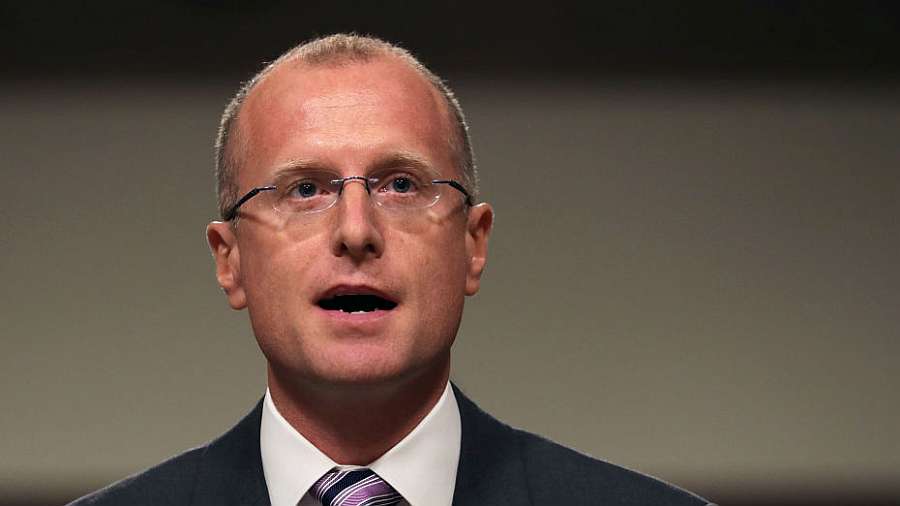FCC's Carr Outlines His 5G 'Leadership Maintenance' Plan
Said what he thinks FCC needs to do to 'maintain' 5G momentum

The smarter way to stay on top of the multichannel video marketplace. Sign up below.
You are now subscribed
Your newsletter sign-up was successful
Signaling it was FCC policies under Republican chairman Ajit Pai that "secured" leadership in 5G, Republican commissioner Brendan Carr has unveiled his plan for maintaining that leadership, though with a Democratic chair and, eventually, majority, Carr has only the power to propose, not impose.
In a speech to the American Enterprise Institute, Carr said that back in 2016 (under former FCC chairman Tom Wheeler), the FCC was at serious risk of ceding the race to 5G to "overseas competitors, at the risk of millions of jobs and trillions of dollars in economic growth.
Also Read: House Dems Seek Delay of Wireless Infrastructure Vote
Enter Pai, and Carr as his designated point man on streamlining cellular infrastructure buildouts, and the Republican FCC turned things around he said.
Carr said it was time to build on that legacy not roll it back with "heavy-handed policies that would turn back the clock on the progress we’ve made."
Those include, he said, efforts to subsidize overbuilds with government money--something likely to happen with the billions Congress has allocated to an effort to achieve universal broadband, with Democrats emphasizing that affordability should be in that definition of universal access.
"We should also see the push for a return to Title II 'net neutrality' for what it is—a push for rate regulation," he said. "Those backing this misguided policy simply refuse to accept the reality that the Internet has flourished since we repealed the ill-advised Title II regulations."
The smarter way to stay on top of the multichannel video marketplace. Sign up below.
He suggested that had Democrats been in charge, the 5G picture would be far less rosy. "We would still be hundreds of megahertz behind and stuck in neutral while our global counterparts passed us by if we had heeded the calls for inaction by some in Washington and on the Commission," he said.
Of the infrastructure reforms Carr spearheaded, he said that "nearly every one of our infrastructure decisions included calls from some of my colleagues for the agency to slow down or stop entirely.
Also Read: FCC Clarifies Buildout Streamlining Rules
Changes to environmental and historic preservation reviews that Carr and the Republicans said were streamlining the process were criticized by the Democrats as potentially running roughshod over local government protections for the environment and history.
The FCC also set shot clocks on siting decisions by localities.
Billing it as a plan to extend 5G leadership, Carr proposed the current and future FCC do the following:
"On the spectrum front for 2021:
o "Auction 100 MHz of spectrum in the 3.45 GHz band at 5G power levels*
o "Auction the 100+ MHz of spectrum in the 2.5 GHz band
o "Adopt an order that permits very low power devices to operate in the 6 GHz band
o "Seek comment on increasing the power levels for CBRS operations in the 3.5 GHz band
"And for 2022 and beyond:
o "Auction the 50 MHz of spectrum between 1300-1350 MHz in 2022
o "Auction another millimeter wave band in 2022, with the 42 GHz as a prime candidate
o "Auction spectrum in the lower 3 GHz, 4.8 GHz, and 7 GHz bands after 2022
"On infrastructure and policy:
o "Produce targeted broadband maps by this fall, not next year
o "Start the 5G Fund auction early next year to support rural builds
o "Create a Federal Lands Desk at the FCC to address permitting delays on federal lands
o 'Act on pending infrastructure reforms to drive down the costs of reaching rural areas
o 'Expand the tower crews needed to complete 5G builds through Carr’s 5G jobs initiative
o 'Reject heavy-handed policies that would turn back the clock on the progress we’ve made"
* Carr did point out that the FCC is scheduled to vote this week [under Democratic acting chairwoman Jessica Rosenworcel] on an order to auction that spectrum, adding: "So I am almost ready to give us as checkmark on this one."
Contributing editor John Eggerton has been an editor and/or writer on media regulation, legislation and policy for over four decades, including covering the FCC, FTC, Congress, the major media trade associations, and the federal courts. In addition to Multichannel News and Broadcasting + Cable, his work has appeared in Radio World, TV Technology, TV Fax, This Week in Consumer Electronics, Variety and the Encyclopedia Britannica.

